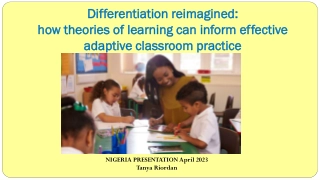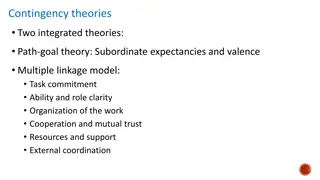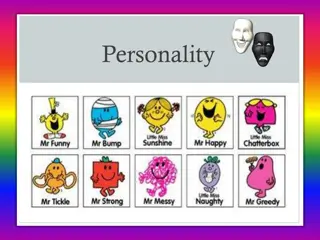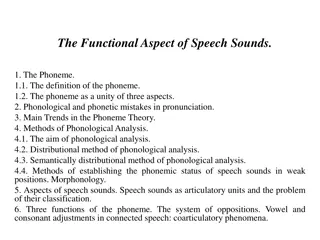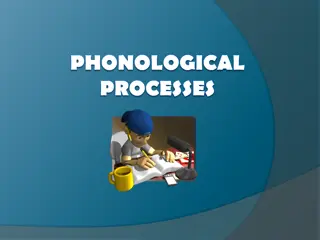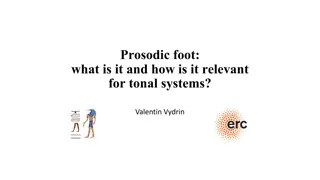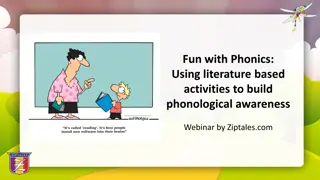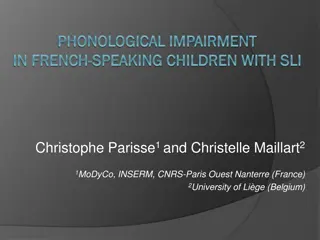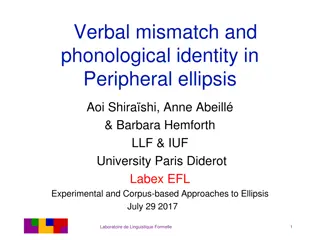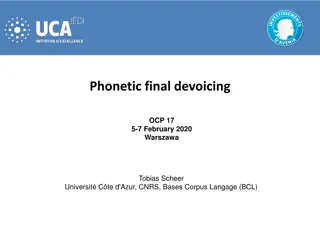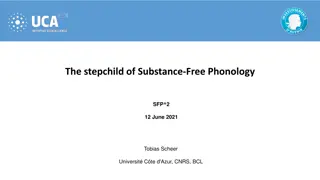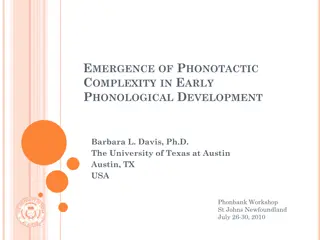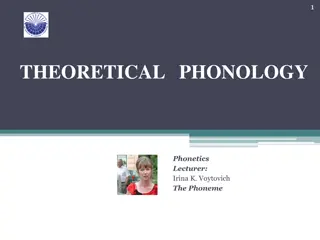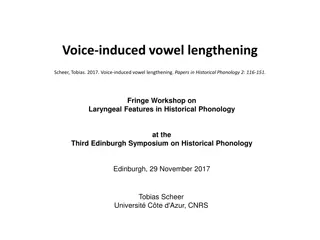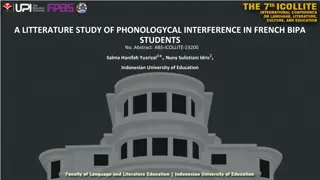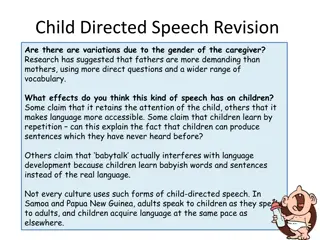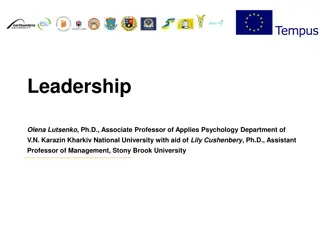Reimagining Differentiation: Enhancing Classroom Practice Through Learning Theories
Explore how theories of learning can inform effective adaptive classroom practice, focusing on the concept of differentiation. The presentation delves into reimagining differentiation, key theories supporting it, and practical strategies to support differentiation in language classrooms. The researc
0 views • 35 slides
Leadership Theories and Power Dynamics in Organizations
Explore contingency theories, dyadic theories, power and influence concepts, and leadership lessons from "12 Angry Men". Dive into the significance of leader-member exchange (LMX), political skills, and the interplay between power, politics, and organizational efficiency.
0 views • 27 slides
Understanding English Syllables: Structure and Description
Explore the concept of syllables in English phonetics through an in-depth analysis of syllabic structure, sonority, constituents, rhyme, nucleus, coda, and phonological perspectives. Delve into the definition of a syllable, its importance in speech production, and the phonetic descriptions of syllab
2 views • 38 slides
Theories Explaining Deviant Sexual Behavior Throughout History
Explore historical theories on deviant sexual behavior, including demonological, anomie, psychoanalytical, human ecology, and somatotyping theories. These theories range from supernatural beliefs of possession to scientific interpretations of societal influences and individual characteristics.
2 views • 33 slides
Testing Extended Theories of Gravity Using Black Hole Shadows
Exploring the shadows of black holes as a method to test extended theories of gravity, this study discusses the existence of black holes, gravitational wave astronomy, and direct imaging. Researchers Oleg Zenin, Stanislav Alexeyev, Alexandra Nemtinova, and Artem Baiderin present findings on black ho
5 views • 18 slides
Insights into Theories of Motivation and Their Application
Motivation, a driving force behind human behavior, is explored through various theories like Maslow's hierarchy of needs, McClelland's learned needs theory, and others. Understanding these theories can help organizations enhance worker productivity by addressing different motivational factors.
9 views • 21 slides
Understanding Key Nursing Philosophies and Theories
Explore the development of nursing philosophies and theories with a focus on prominent figures like Henderson, Orem, Roy, Rogers, Leninger, and Pender. Delve into the historical stages of philosophical development in nursing and the three schools of thought in nursing. Engage in group discussions an
10 views • 12 slides
Understanding Business Ethics Theories and Principles
Explore various business ethics theories including Ethical Concepts, Moral Behavior Development, Ethical Principles, and the Role of Ethics in Business. Delve into the concept of ethics, moral behavior evolution, ethical principles like autonomy, honesty, justice, and integrity, and the importance o
10 views • 17 slides
Managerial Theories and Criticisms
Delve into the world of management theories, from classical to modern approaches, exploring the foundational principles of management, the evolution of theories, and criticisms of traditional perspectives. Learn about the basic functions of management and the insightful perspectives of renowned theo
2 views • 11 slides
Understanding Personality: Theories, Types, and Assessment
Exploring the intricate world of personality, this comprehensive guide delves into major theories of personality development, assessment methods, cultural influences, and key contributors. Discover the different types of personalities, including Type A and Type B, and unravel the complexities of psy
1 views • 96 slides
Psychological Theories of Criminality: Understanding the Roots
Psychological theories of criminality delve into the association between intelligence, personality, learning, and criminal behavior. Major theories include Psychodynamic Theory by Freud, Behavioral Theory by Bandura, and Cognitive Theory by Kohlberg. These theories explore how unconscious mental pro
1 views • 20 slides
Exploring Leadership Theories: Traits and Behaviors
Leadership theories have evolved from trait theory focusing on personal qualities to behavioral theories emphasizing actions and interactions. While early research sought universal traits for leadership, it encountered challenges due to varied traits among leaders and non-leaders. Behavioral theorie
2 views • 29 slides
Unraveling COVID-19 Conspiracy Theories and Hoaxes
Exploring various conspiracy theories surrounding the origins of COVID-19, from bat soup to bioweapons and espionage. Dive into wilder theories involving population control, world war, and even Disney's supposed predictions. Understand the differences between conspiracy theories and hoaxes, shedding
2 views • 11 slides
Understanding the Functional Aspect of Speech Sounds
The functional aspect of speech sounds delves into the concept of phonemes, phonological and phonetic mistakes in pronunciation, main trends in the phoneme theory, and methods of phonological analysis. It explores the definition of phonemes, the three aspects of phonemes, and the different views on
0 views • 30 slides
Understanding Sociological Theories and Frameworks
Sociological theories, encompassing micro and macro perspectives, provide a lens to interpret societal dynamics. Consensus theories like functionalism emphasize shared norms, while conflict theories such as Marxism highlight social inequalities. Social action theories like interactionism focus on in
3 views • 21 slides
Online Seminar: Theories of Learning in Initial Teacher Education
This collection of online seminar slides introduces pre-service teachers to major theories of learning, including the Science of Learning through cognitive neuroscience. The presentation aims to help educators consider implications for teaching, recognize theories in action, and pose critical questi
1 views • 11 slides
Theories of Causation in Psychological and Social Sciences
Overview of theories of causation categorized into psychological, social psychological, and sociological perspectives. Psychological theories focus on instinctive, biological, and psychological qualities of abusers, including Attachment Theory, Psychodynamic Theory, Social Learning Theory, and Situa
0 views • 15 slides
Introduction to Quantum Chromodynamics & Field Theories in High-Energy Physics
Explore the fundamentals of Quantum Chromodynamics and Classical Field Theories in this informative lecture, covering topics such as global and local symmetries, Lagrangians, actions, and dynamics. Understand the significance of global and local symmetries in classical field theories, along with exa
2 views • 17 slides
Understanding Phonological Processes in English Language
Phonological processes involve changes in linguistic sounds over time, impacting language fluency and oral production significantly. EFL students can benefit from knowledge of these processes, like linking, gemination, elision, metathesis, assimilation, haplology, and coalescence, to enhance their l
0 views • 17 slides
Comprehensive Overview of Student Affairs Theories
This collection explores key theories in student affairs, including cognitive-structural theories, learning theories, and person-environment theories. Cognitive-structural theories delve into how individuals process information, while learning theories examine how people absorb knowledge. Person-env
3 views • 19 slides
Understanding Theories and Concepts in Research
The content delves into the fundamental concepts of theories and variables in research. It discusses the nature of theories, including descriptive, explanatory, and predictive theories. Additionally, it examines the role of concepts in providing identity and meaning to objects and phenomena. Through
2 views • 55 slides
Classical Trade Theories and Their Limitations in International Economics
Classical trade theories such as the Theory of Absolute Advantage by Adam Smith and the Theory of Comparative Advantage by David Ricardo highlight the benefits of free trade and specialization based on natural advantages. However, these theories have limitations, such as the inability to explain sce
0 views • 8 slides
Understanding Prosodic Foot and Its Relevance in Linguistics
The prosodic foot is a vital unit in linguistic analysis associated with stress and word prominence. It serves as an intermediary between syllables and words, influencing tonal systems and phonological structures through patterns like metrical parsing and foot-headedness. Language-specific manifesta
11 views • 20 slides
Applying Theories and Models in Integrated Health: Module 3 Overview
This module delves into the application of various theories, perspectives, and practice models in integrated healthcare. Students will learn to utilize different theories to enhance their understanding and practice in integrated health, focusing on aspects like personal impact, behavioral change the
0 views • 78 slides
Exploring Phonological Awareness Through Literature-Based Activities
Explore the importance of phonological awareness in decoding written text and discover how literature-based activities can enhance phonemic and syllabic skills in students. The curriculum references from Australia and New Zealand highlight the significance of sound-letter associations. Embrace a lit
0 views • 34 slides
Phonological Impairment in French-speaking Children with SLI: Evidence and Origins
This study explores phonological impairment in French-speaking children with SLI, confirming specific difficulties in phonology compared to age-matched peers and across different languages. Evidence suggests phonological delays and deficits, with stronger evidence found through comparison with MLU-m
0 views • 50 slides
Accelerating Lemma Learning Using Joins in Satisfiability Modulo Theories
Explore the use of joins in accelerating lemma learning within the context of Satisfiability Modulo Theories (SMT). The study covers various SMT applications at Microsoft and delves into the development of the Z3 solver. Key topics include theories, arithmetic operations, array theory, uninterpreted
0 views • 25 slides
Verbal Mismatch and Phonological Identity in Peripheral Ellipsis
The study delves into verbal mismatch and phonological identity in peripheral ellipsis, covering topics such as syntactic mismatches, peripheral ellipsis and mismatch, and stricter identity requirements in peripheral ellipsis compared to other types of ellipsis. Various examples and analyses are pre
0 views • 49 slides
Understanding Phonetic Final Devoicing and Its Implications in Phonological Theory
Phonetic Final Obstruent Devoicing (FOD) challenges traditional phonological theories by presenting instances where devoicing cannot be purely phonological but must be phonetic in nature. This phenomena is evident in Proto- and Old French where word-final consonants devoice despite having intervocal
0 views • 30 slides
Exploration of Substance-Free Phonology and Phonological Theory
This text delves into the concept of substance-free phonology, discussing the arbitrariness of phonological items, the distinction between phonologically meaningful and meaningless items, and the relationship between phonology and phonetics. It also explores the role of sonority in phonological theo
0 views • 11 slides
Emergence of Phonotactic Complexity in Early Phonological Development
Barbara L. Davis, Ph.D., from The University of Texas at Austin, presents research on phonotactic complexity in early phonological development using the Texas Speech Production (TSP) database. The study examines the emergence of phonotactic properties in speech acquisition among typically developing
0 views • 39 slides
Introduction to Theoretical Phonology: Understanding Phonemes and Speech Sounds
The lecture explores the fundamental concepts of phonology, focusing on phonemes, speech sounds, phonological theories, and their historical background. It delves into the functions of phonemes in forming language units, distinguishing words, and their connection to meaning. Various theories and fun
0 views • 43 slides
Understanding Phonetic and Phonological Properties of Voicing in Polish Language
Explore the phonetic and phonological aspects of voicing in the Polish language, including the representation of contrasts, laryngeal distributions, and processes like neutralization and assimilation. Dive into topics like final obstruent devoicing, two-way voicing contrast, and the role of sonorant
0 views • 40 slides
Voice-Induced Vowel Lengthening in Phonology Research
Exploring the phenomenon of voice-induced vowel lengthening, this research delves into spontaneous vs. non-spontaneous voicing patterns and the documented transmission of voicing from vowels/sonorants to voiceless obstruents. The study discusses various theories on voice transmission from sonorants/
2 views • 35 slides
Theories and Concepts in Semantics: Classical vs. Prototype Approaches
Explore different theories of concepts in semantics, including classical theories based on necessary and sufficient conditions, causal theories, and prototype theories. Compare their strengths and limitations in handling fuzziness, asymmetry, and internal structure of concepts. Discover how experime
1 views • 46 slides
Integrating Theories and Models for Enhanced Health Practice
Explore the application of theories, perspectives, and practice models in integrated health through Module 3. Learn how theories guide assessment, treatment, and patient outcomes. Discover common theories enhancing assessment and supporting individuals through grief and loss. Gain insights into the
0 views • 78 slides
Comprehensive Overview of Leadership Theories and Styles
Leadership encompasses the ability to influence a group towards achieving goals by knowing oneself, communicating vision, building trust, and taking effective action. Various leadership styles include Autocratic, Democratic, Free-Rein, and Paternalistic, each with distinct decision-making approaches
0 views • 19 slides
Phonological Interference in French BIPA Students: A Literature Study
BIPA students face challenges in pronunciation due to phonological interference, especially in French-speaking students. This study explores the linguistic aspects contributing to pronunciation errors and proposes phonetic corrections. Literature review discusses language interference and factors in
0 views • 11 slides
Insights into Child-Directed Speech Variations and Effects
Research examines variations in child-directed speech due to caregiver gender, with fathers often being more demanding than mothers. Such speech impacts children's attention, language accessibility, and learning mechanisms, showcasing contrasting views on its effectiveness. The article delves into p
0 views • 10 slides
Understanding Leadership Theories and Styles
Leadership involves influencing a group towards a common goal. Traits, interaction styles, and group dynamics play vital roles in effective leadership. Various theories, such as Trait Theories and Synthetic Leadership Theories, provide insights into different aspects of leadership. Understanding lea
0 views • 41 slides
